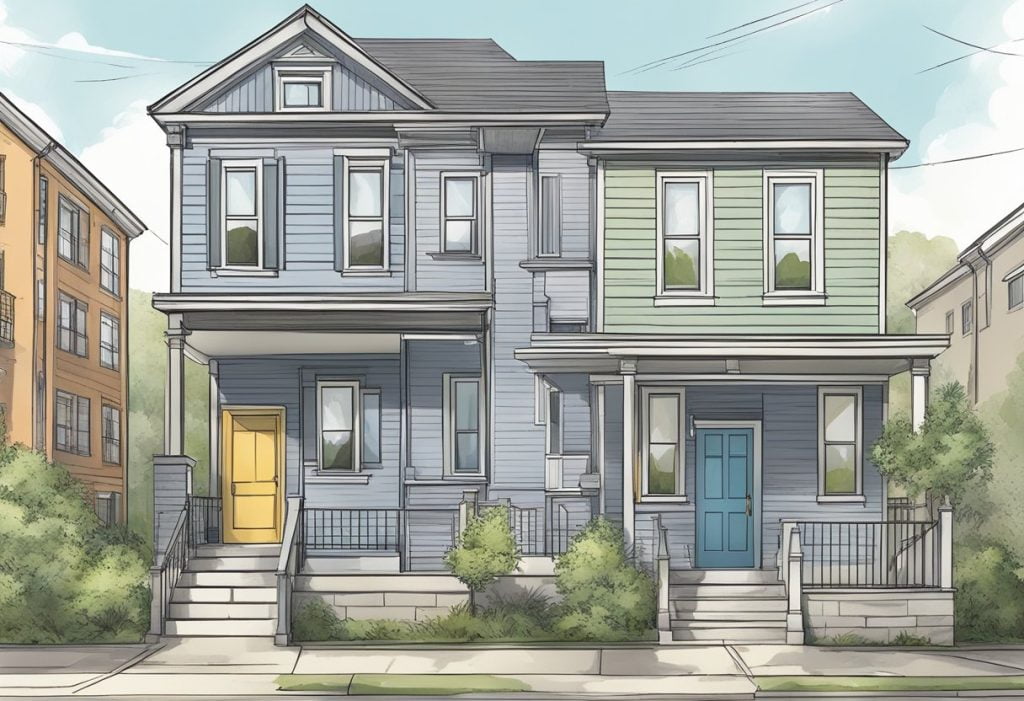Last Updated on March 18, 2024 by Kelvin Nielsen
Understanding your rights as a tenant in Georgia is crucial to navigating the rental landscape. Landlord-tenant law governs the relationship between you and your landlord. It includes your right to a habitable living space, your privacy, and the return of your security deposit, among other aspects.

Particular circumstances may lead you to consider terminating your lease early. In Georgia, breaking a lease may come with certain financial implications. It’s essential to know the possible costs and the legal procedures required.
Your obligations and those of your landlord are specified in the rental agreement and by state law. These rules establish the groundwork for what you both can and cannot do. Consequences for failing to adhere to these can vary, including potential eviction or legal disputes.
Related Posts:
- How Much Is It to Break a Lease in Georgia: Understand Your Financial Obligations
- Georgia Tenant Rights: Breaking a Lease Guide
- Can Maintenance Come in Without Notice in Florida? Know Your Rights
Understanding Georgia Landlord-Tenant Law
In Georgia, the relationship between landlords and tenants is governed by specific laws. These regulations ensure fairness and clarity in housing arrangements.
Legal Framework and Relevant Authorities
Georgia’s landlord-tenant law is primarily found in the “Georgia Landlord and Tenant Act.” Legal research is essential to understand your rights and obligations fully. The Georgia Department of Community Affairs provides resources for tenants and landlords. For comprehensive legal assistance, the Georgia Legal Services Program is an invaluable resource.
Rights and Obligations of Tenants and Landlords
As a tenant in Georgia, you have the right to a habitable living space and the responsibility to pay rent on time. Landlords must conduct repairs in a timely manner, while you must avoid property damage.
Clear guidelines on security deposits, lease termination, and eviction procedures are laid out in the state law. Consulting lawhelp.org can provide you with detailed information.
Fair Housing and Anti-Discrimination Laws
Fair housing laws, enforced by the U.S. Department of Housing and Urban Development and the Georgia Commission on Equal Opportunity, protect you from discrimination. Your race, color, national origin, religion, sex, familial status, or disability should not influence a landlord’s decision. For issues related to discrimination, these authorities provide recourse for tenants facing unfair treatment.
Lease Agreements and Security Deposits
When renting property in Georgia, it’s crucial to understand your lease agreement and the specifics about security deposits. These terms will impact your financial obligations and rights as a tenant.
Understanding the Lease Agreement
A lease agreement is a binding contract between you and your landlord. This document outlines your rental terms, such as rent amount and lease duration. It is your responsibility to read and comprehend this agreement before signing. All terms and conditions, including those for renewal and termination, must be clearly stated in the lease.
Security Deposit Terms and Deductions
Security deposits in Georgia serve as financial protection for the landlord. They cover potential property damage beyond normal wear and tear. You should note the condition of the property at move-in to avoid unwarranted deductions.
By law, landlords must place security deposits in an escrow account and return them within one month after tenancy ends, less any justified deductions for property damage.
Tenant Rights and Responsibilities

As a tenant in Georgia, you have specific rights and obligations regarding your rental property. These are essential to ensure fair and lawful treatment for both you and your landlord.
Rent Payment and Late Fees
You are responsible for paying rent on time. This is typically due on the first of each month, unless your lease states otherwise. Georgia law allows landlords to charge late fees, but these must be reasonable and outlined in your lease agreement. If rent is not paid, landlords may start eviction proceedings after giving a written notice.
Maintenance and Repairs
Your landlord must provide a habitable dwelling. The rental property should be safe and fit to live in. You must report any needed repairs promptly. Normal wear and tear is expected, but you may be responsible for damages beyond that. Your landlord is required to perform necessary maintenance and repairs to keep the property habitable.
Privacy and Right to a Habitable Environment
You are entitled to privacy in your rental home. Landlords must give proper notice before entering, typically 24 hours. The notice requirements may be different in case of emergencies. You also have the right to a safe and habitable living environment. This includes functioning utilities, heat, and water. It’s known as the warranty of habitability. Your landlord must not disturb this right.
The Eviction Process in Georgia

In Georgia, your eviction from a rental property follows a strict legal process. Landlords must adhere to specific procedures and respect your rights during every step.
Causes and Procedures for Eviction
Georgia law permits eviction for various reasons. Nonpayment of rent is the most common. Lease violations can also lead landlords to seek eviction. Here’s what you need to know:
- Notice Requirements: You must receive a demand for possession. This notice typically provides 7 days for you to pay or correct a lease violation.
- Filing in Court: If you don’t comply with the notice, the landlord may file an eviction case in Georgia magistrate court.
- Summons: You will be served a summons to appear in court. The document will state the date and time of your hearing.
Tenant Protections and Retaliation
As a tenant in Georgia, certain protections are in place to prevent unfair eviction:
- Illegal Eviction: Your landlord cannot forcibly remove you or change locks without a court order, known as a writ of possession.
- Retaliation: Evicting you as retaliation for legal actions like requesting repairs is prohibited.
- Defense in Court: During your court hearing, you can present any defenses you may have to the eviction.
Seeking Assistance and Legal Action

In Georgia, as a tenant, you have certain rights when disputes with your landlord arise. It’s crucial to understand when to seek legal counsel and how to use the court system effectively.
When to Seek Legal Counsel
If you face a serious tenant issue, consult a private attorney. You should seek legal advice if the dispute is complex or the stakes are high. The Georgia Legal Services Program Office can provide assistance if you cannot afford a lawyer.
Filing a Lawsuit and Using Small Claims Court
For claims under $15,000, consider small claims court. This court is a quicker, less formal option than others. Before filing a lawsuit, review the Georgia Landlord-Tenant Handbook to understand your rights and responsibilities.
Frequently Asked Questions
Tenants in Georgia have specific rights under the law. This section answers common questions regarding these rights.
What legal actions can a tenant take if a landlord fails to make necessary repairs in Georgia?
You have the right to request repairs in writing and give your landlord a chance to fix the issue. If they fail, you may take legal actions, such as repair and deduct, or file a lawsuit.
What are the stipulated rights and protections for a month-to-month tenant in Georgia?
As a month-to-month tenant, you are protected against abrupt eviction without notice. Your landlord must provide a 60-day notice for termination and you must give 30 days’ notice to vacate.
Under what circumstances can a tenant legally break a lease in Georgia?
You may break your lease legally in Georgia if your rental unit is unsafe or violates health codes. Domestic violence victims and active military personnel also have rights to terminate leases early.
What are the procedures for filing a complaint against a landlord in this state?
You must document all communication and violations before filing a complaint. You can file with the Georgia Department of Community Affairs or take the case to the magistrate court.
What amount of notice is a landlord required to provide a tenant before eviction in Georgia?
Landlords must provide at least 60 days’ notice for lease termination without cause. For evictions due to the breach of lease or nonpayment, the notice can be as short as 7 days.
How are commercial tenants’ rights delineated differently from residential tenants’ in Georgia?
Commercial tenants have less statutory protection than residential tenants. Their rights are primarily governed by the lease agreement, and eviction proceedings can be swifter.
Sources: GA Code Title 44 Chapter 7, The Eviction Process in Georgia,

Hi, I’m Kelvin Nielsen, an experienced landlord and accomplished real estate lawyer. My focus is on answering your questions about renting in the hopes of making your life as a renter or a landlord a bit easier.







